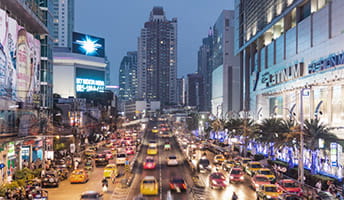
The difference between an epidemic and a pandemic may seem a little pedantic. With the present Coronavirus outbreak, we are waiting to see if another epicentre of infection starts in another country. This would certainly be significant. For a pandemic to officially be designated, however, the outbreak should probably be in another region of the world - but this is the sort of thing about which academics like to argue. In reality, if chains of transmission started in Singapore, Hong Kong, or Sydney, the implications for the country and the rest of the world would be considerable.
We only have to look back to 2015 to see the chaos that was caused when an outcrop of an epidemic started in a new country. In South Korea, a solitary case of the Middle East Respiratory Syndrome (MERS) in a traveller from Kuwait, eventually led to 38 fatalities from 186 infected individuals who caught the virus in Korea. By the end of the epidemic, almost 17,000 people had been placed at some risk of infection, all requiring quarantine. Fear was understandably rife. Although, these numbers are clearly on a far smaller scale to the present coronavirus infection in China, the almost immediate effects on tourism and later trade, was said to have caused a serious effect on the economy of South Korea.

This case in South Korea should be contrasted with another episode of MERS infection – this time occurring in Bangkok. A businessman from Oman, infected with MERS, was treated at the world-class Bumrungrad Hospital in Bangkok. It was efficiently diagnosed, appropriate precautions were taken, and apart from 20 people who were quarantined, no further effects of MERS were seen in the city or the country.
Comparing the Korean and Thai cases of MERS, we are able to see what could happen with the coronavirus over the next weeks and months should an epidemic be established outside of China. For infections that are swiftly identified, where contact tracing is rapid and those at risk are quarantined, on-going transmission of the virus may not occur as with the Thai case of MERS. An epicentre will not be set-up in such a country. Although predicting the future is at best unwise, the most significant risk of local infection of the coronavirus may be in countries of variable healthcare provision, where the tried and tested measures of infectious disease control – case identification and quarantine – are lacking or slow. In this light, it may not be centres such as London or Singapore that will be at appreciable risk, but perhaps cities such as Manila or Mumbai. Time will tell.

These differences are stark but equally so are the dissimilarities in context. The DRC is of course a resource-poor country, with limited infrastructure, basic hospital facilities, and few easy connections with the rest of the world. Each of these factors are reversed in the coronavirus epidemic. But it is the on-going militia activity in DRC that is perhaps the most significant contextual difference. The hero-healthcare workers in the DRC have been attempting to treat patients whilst buildings have been attacked and some of their number murdered. Despite the advent of the recently developed Ebola vaccine, control of the outbreak has not been established. Following militia activity, the efforts of the WHO have been necessarily suspended, risking further transmission of the Ebola. This is a far cry from the control that the Chinese authorities have been able to rapidly apply across their great cities. Taking everything into account, the differences between the Ebola and the coronavirus epidemics, do suggest that control of the virus might be gained far sooner – although considerably more people infected.
One factor that is common to both epidemics – in fact all epidemics – is fear, however: fear should loved ones become infected; fear of those who might spread the virus. We are seeing the beginning of this in some of the reports detailing anti-Chinese sentiment in various countries and even attacks on people from Asia. In fact, the Korean Consulate in one country has issued warnings to show increased alertness to anti-Asian activity. Whilst such fear is on one level understandable - in explaining our distrust of outsiders, group psychology exposes our human frailty - we must always counteract baser instincts with both knowledge and courage. Epidemics bring out both the best and worst in us.







